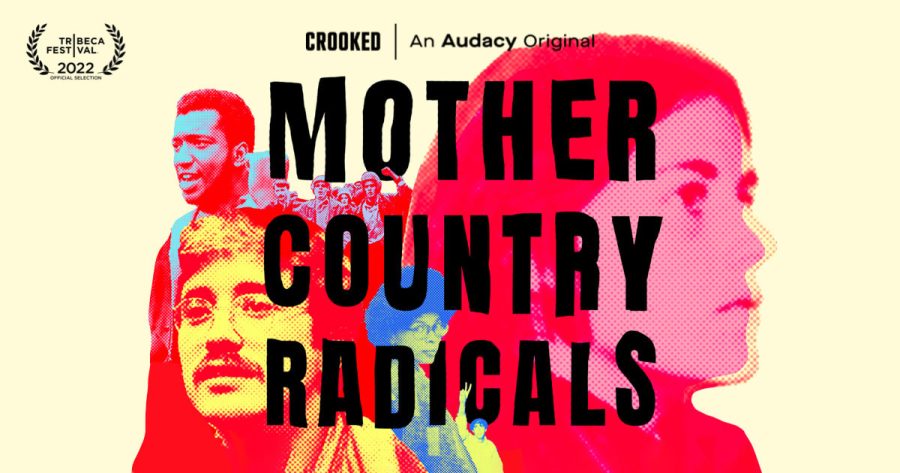Podcast hosted by Lab parent explores history of revolutionary group
Audacy Originals
“Mother Country Radicals” is a podcast about the 1970s far-left organization, the Weather Underground. The show is hosted by the son of two former members and current Lab parent, Zayd Dohrn.
April 11, 2023
The “Mother Country Radicals” podcast opens with several descriptions of Bernardine Dohrn, a former leader of the 1970s far-left organization, the Weather Underground. Lines of narration spliced with archival recordings create an imposing image for listeners: she’s on the FBI’s most wanted list, an “enemy of the state,” a “homegrown terrorist,” “the most dangerous woman in America.”
Abruptly, this narrative is subverted, because, for the creator and narrator of the podcast, Bernardine Dohrn is more than the threatening figure described in old clips and articles, she’s also his mother.
Zayd Dohrn is a professor at Northwestern, a Lab parent and alumnus, and the son of Bill Ayers and Bernardine Dohrn, both former Weather Underground members. (Mr. Dohrn is the parent of two U-High students who are affiliated with the Midway. Neither was involved in producing this story.) In “Mother Country Radicals,” he walks listeners through a deeply personal history of the Weather Underground and the radical environment that shaped his early life through interviews, historical recordings and his personal perspective.
In the 1970s, the Weather Underground wanted a revolution. Young people in the United States were galvanized by the Vietnam War, the civil rights movement, American imperialism and government corruption. Facing these systemic problems, members of the Weather Underground felt that meaningful change could not be won without more disruptive methods.
The organization carried out domestic bombings, participated in a jailbreak, organized larger protest movements, created and distributed revolutionary agitprop, and declared war on the U.S. government. The young radicals in the Weather Underground remain contentious. They were strong advocates of equality, but their violent tactics were heavily criticized and led to the accidental death of several of the group’s own members. In 10 episodes, Mr. Dohrn explores this complex history alongside the personal history that motivated the people behind the organization. While the podcast focuses on the past, Mr. Dohrn thinks the story contains valuable context for the current world.
“Right now we’re living through a parallel moment when people who might have been able to ignore a lot of the injustice in the world before are really seeing it for the first time,” he said.
Mr. Dohrn explained that the organization was really just a “group of kids,” many of whom come from privilege. In many ways, these radicals and their messages speak specifically to Lab students.
“As they were growing up,” he said, “they got to see what the world looked like and all the unfairness that excited around them, the injustice upon which their privilege was based, and they decided to dedicate their lives to changing that.”
One clear parallel between the environment that shaped the Weather Underground and today’s is racial inequality and police violence. Mr. Dohrn says his story can’t be told outside of the lens of race. Through interviews, the podcast explores the history of the Black Liberation Army, the Black Panther Party and other important Black activist movements, navigating the nuance of how race impacted this history
He said, “I talk in the podcast about police violence as one example. You know, I was making the show during the time when George Floyd was killed and during Black Lives Matter protests. It just kept striking me that all of these people I was talking to who had been radicals and revolutionaries in the ’70s and ’80s were first radicalized by police killings for Black people.”
Today, Mr. Dohrn sees echoes of this same radicalisation in modern movements. His parents’ story also speaks to the process of maturing that transcends period and motivation. Young people grew up while at the forefront of these radical movements, absorbed by a turbulent reality. While it feels far-removed, reflecting on the story of the Weather Underground is productive for anyone in the process of maturing and understanding personal identity.
“What would make you decide to sacrifice part of your own privilege or part of your own future to, you know, to make a better world?” Mr. Dorhn said. “One of the things I find most interesting about the people I’m writing about is that a lot of them really gave up the idea of college or graduate school or their promising future to fight for something they believed in.”
Listening to this history can be frustrating. So many of the issues fought against in the ’70s and ’80s remain prominent today. Mr. Dorhn and his interview subjects feel that frustration. However, Dorhn asks today’s young people to stay optimistic. There has been so much progress in the last 50 years, and progress will always continue as long as new generations don’t give up.
While the podcast focuses on the history of Mr. Dorhn’s parents, it also makes a larger statement about how history continues to inspire and shape people. In “Mother Country Radicals,” three generations process a shared history: Mr. Dorhn interviews his parents, he narrates from his own personal experience growing up, and he chooses to interview his daughter, Light.
“I think, like a lot of young people, I was thinking a lot about how to understand my parents as a way of understanding where I came from and what I could take from them. You know, what I could learn from them and also what I didn’t want to learn from them. How I wanted to be different from them,” he said. “So in a way, I think of the show as being about growing up and about learning about your parents and about deciding who you want to be.”
































































